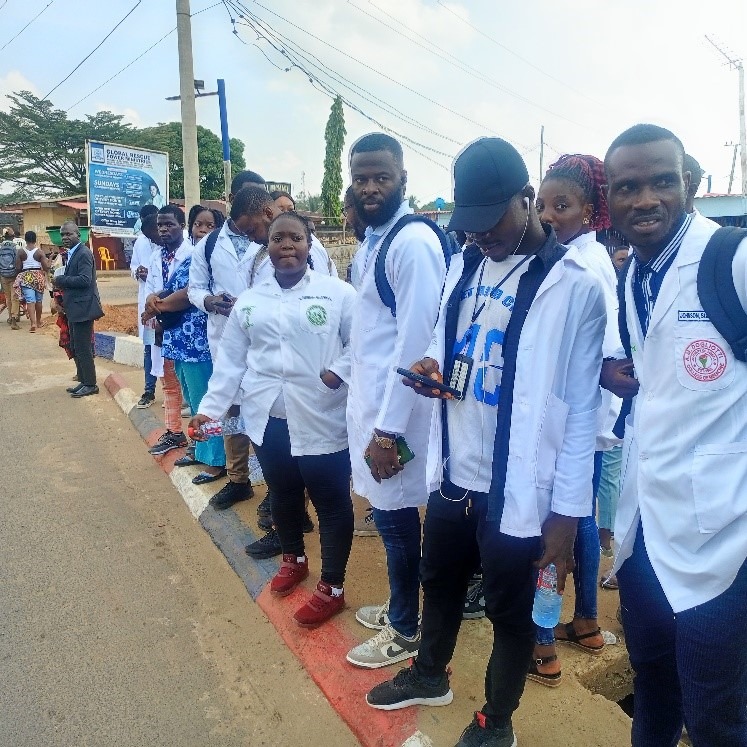The financial stability of over 450 medical students in Liberia hangs precariously in the balance as a five-month stipend backlog from the government threatens to disrupt their education and livelihoods. These students, enrolled in the University of Liberia’s medical and pharmacy programs, rely on a monthly stipend of US$200 to cover their basic living expenses, given the demanding, full-time nature of their studies. The non-payment of these stipends has created significant financial hardship, forcing many students to struggle to meet their basic needs. After months of fruitless negotiations with the University of Liberia and the Ministry of Finance and Development Planning, the students have resorted to direct action, gathering at President Joseph Nyuma Boakai’s residence to demand immediate intervention. Their plea underscores the critical role this stipend plays in their academic pursuits and daily survival.
Student leaders, representing both the medical and pharmacy programs, highlight the dire consequences of the stipend arrears. Dennis Blay, President of the Liberia Medical Students Association, emphasizes the essential nature of the stipend, stating that it allows students to focus on their rigorous studies without the added burden of financial worries. He explains that the Ministry of Finance, despite earlier assurances, now claims insufficient funds and has proposed paying only one month’s stipend, requiring the students to waive the remaining four months. This proposal has been met with strong resistance from the student body, who view it as an unacceptable solution to their financial predicament. The students’ inability to secure their rightful stipends through established channels has led them to escalate their actions, resorting to protests at the President’s residence until their demands are met.
Hnoede L. Brownell, President of the Pharmacy Students Association, further underscores the students’ plight, highlighting the impossibility of holding part-time jobs due to the demanding nature of their academic schedules. She points out that the stipend is crucial for many students who live off-campus due to limited dormitory capacity, adding further financial strain through rental expenses. Brownell’s statement reflects the students’ collective frustration and determination to continue their protests until the government fulfills its financial obligation. This situation highlights the precarious financial position of these future healthcare professionals, who are already facing the challenges of a demanding academic curriculum.
This financial crisis within the Liberian medical education system coincides with broader discontent among healthcare professionals nationwide. The inadequate pay of healthcare workers has become a source of growing frustration, with specialized doctors also expressing dissatisfaction over the government’s reluctance to offer competitive wages. This wider discontent within the health sector underscores a systemic issue of undervaluing healthcare professionals and highlights the urgency of addressing these financial concerns to ensure the stability and effectiveness of Liberia’s healthcare system.
Adding to the growing tension, the Assembly of Liberian Health Professionals, encompassing prominent organizations such as the Liberia Nurses Association and the Liberia Medical and Dental Association, has publicly condemned the government’s recent decision to implement a mere US$50 salary top-up for health workers. This action, deemed a violation of the Health Sector Pay Grade and Salary Reclassification Policy, has further fueled the discontent among healthcare professionals. The assembly’s threat of a nationwide strike unless the government reconsiders its decision reflects the escalating tensions within the health sector and the potential for widespread disruption of healthcare services.
The convergence of these issues – the student stipend arrears, the inadequate pay for existing healthcare workers, and the contentious salary top-up policy – paints a picture of a healthcare system grappling with significant financial challenges. The government’s response to these concerns will be crucial in determining the future stability of Liberia’s healthcare workforce and its ability to provide quality care to its citizens. The students’ persistent protests serve as a stark reminder of the human cost of these financial shortfalls and the urgent need for a comprehensive and sustainable solution. The situation underscores the vital importance of investing in healthcare education and ensuring the well-being of future healthcare professionals, who will ultimately be responsible for the health and well-being of the nation.


